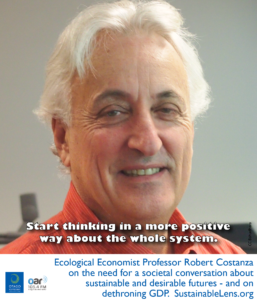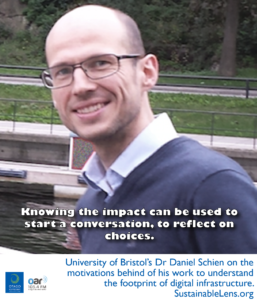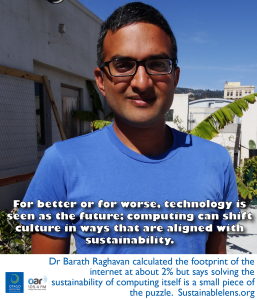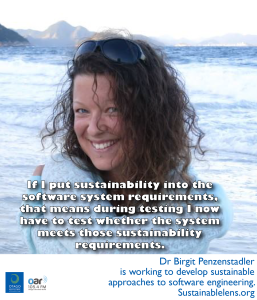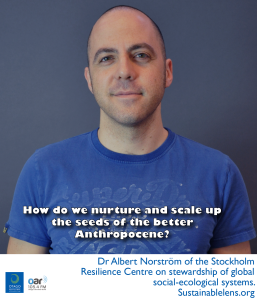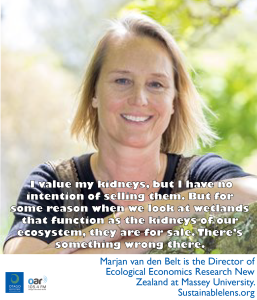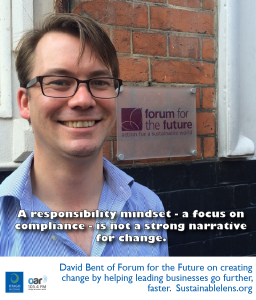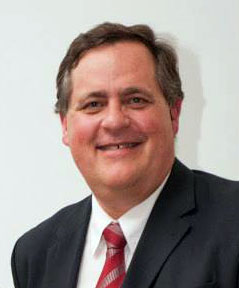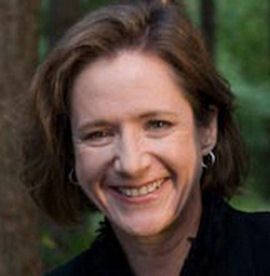| Sam: |
Where did you grow up?
|
| Robert: |
I grew up mainly in South Florida, born in Pennsylvania. We moved to South Florida because found that my dad worked in the steel mill at, was the site of the first case of fatal air pollution the United States, Donora Pennsylvania, and they eventually closed down the steel mill, and I think the clean air act was partly the result.
|
| Sam: |
What did you want to be when you grew up?
|
| Robert: |
When I grew up? I don’t know. It wasn’t that far back, but …
|
| Sam: |
Once you got past the astronaut and a fireman.
|
| Robert: |
I did have the astronaut thing for a while, but I think when I got to a university, I got very interested in how things are connected, the systems approach. My PhD was in systems ecology, and had HT Odum a famous systems ecologist as my PhD advisor. It was more about looking at how the world is connected, and interconnected, and not looking at humans as separate from nature, but humans as an interval part of a broader natural system, we’re not unnatural by any means. I think a lot of academic research was, and still is I think, is focused around looking at the economy as a separate thing, looking at nature as a separate thing, looking at ecology and economics separately, and so eventually my research was more about building an ecological economics. How do we actually integrate across the different, sometimes distinct disciplines that really should be talking to each other if we want to understand the world, and how it works, and particularly how to make it both sustainable and desirable.
|
| Sam: |
Okay, so I’m going to slow you down. You did architecture first?
|
| Robert: |
I did architecture first, yes.
|
| Sam: |
Why architecture?
|
| Robert: |
Well, actually I started in engineering. In aerospace engineering, this was the astronaut phase. I thought engineering, at least the way was being taught, was a little too narrow, not very creative, and so I switched to architecture that would have a little more creativity, but still yeah, the engineering science and math background. Got involved as part of that degree program in a study of South Florida, and how it evolved over time, and landscape planning, and landscape ecology, and architecture, that led directly into systems ecology field.
|
|
It was about understanding broader landscapes. When we look at the world at that scale, and larger, then we can’t ignore the tight interconnections between the human dominated part of the system, and the rest of the system. There is a study of how South Florida, the Kissimmee Everglades basin had evolved over the period from 1900, to the present that time. Went to 1973, it’s been a while. You can see the tremendous impact that humans have had on that system by draining the Everglades, by changing the way that system functioned. Trying to understand that evolution, and that landscape, and how to design a landscape that maybe worked better going forward.
|
| Sam: |
Odum – Â who is one of those textbooks that sits on my desk, and has done forever, its systems similar to electric circuitry approaches?
|
| Robert: |
Well, that’s the system diagramming he came up with, and systems dynamics modelling, computer modelling, I think was also a part of, and it’s still a part of what I’m interested in doing. How do you understand these systems, not just from a qualitative point of view, but from a quantitative point of view. When we build computer models to simulate, and replicate the way systems work, to better understand them, to better understand really the uncertainties involved in how they behave as well, and give us a better handle on how to better manage them.
|
| Sam: |
Your PhD was on the Everglades?  What were you trying to answer there?
|
| Robert: |
It was a sustainability question, the project was funded around those terms, how do we create a South Florida landscape that was more sustainable, given the many issues that are still topical there? Changing the water flow patterns in the Everglades, and the effects that that had on fire, and nutrient regimes, and invasive plant invasions, and water supply for the East Coast, and development patterns, and the urban patterns in South Florida. All of those issues together, Â led to this idea of ecosystem services, and natural capital. What is nature, the rest of nature I should say? Not the human part of the system supplying to the human part of the system that, in a way benefits, and maintaining life support, and controlling climate, and controlling water flow, and controlling nutrients, etc.
|
|
This idea of ecosystem services and natural capital, became a big part of it. I think it’s also a different way of looking at how to manage these systems. Traditionally conservationists have been protecting nature for its own sake, let’s keep people out of it, we want nature to be, so we’re going to preserve, which only goes so far. I think you can make that argument, but I think, in many cases, it’s maybe more effective to make the argument that yes, these places are beautiful, but they’re also very necessary to our survival, they’re productive, they’re not just pretty pictures. In fact, you could argue that the reason people appreciate the beauty in nature, is just that deep level understanding that these are systems that are required for our continued well-being.
|
| Sam: |
This is in the early 70s?
|
| Robert: |
Yes. Early 70s, 80s, yeah, and into the present.
|
| Sam: |
In the early 70s that was a very different view from the prevailing view of, I just say, conservation over here, was human development over there. The great thing of teh Brundtland report was pulling all those things together. That came after came after your PhD, but before that, somebody was being holistic in their thinking even to get you working on it.
|
| Robert: |
Sure, and I think it was Odum, and others that are thinking the same way. There were 2 Odums actually, there was Eugene and Howard Odum. Eugene was the first author of the textbook that you have, or EP Odum, and HT Odum was my advisor, they worked together on the textbook. Other systems ecologists, and systems thinkers, Jay Forrester was also one of the influences. Herman Daly was actually a colleague of mine in my first job at LSU after I graduated with a PhD, and went to Louisiana state.
|
| Sam: |
You were colleagues together there, and eventually started the Society for ecological economics, and the journal ecological economics.
|
| Robert: |
We were trying to build that-institutional structure for people to work in a more trans-disciplinary way on these issues.
|
| Sam: |
And a minor in economics?
|
| Robert: |
Yeah.
|
| Sam: |
I can’t imagine the views that you would have would go down too well with the traditional … the classical economic view. Did you manage to keep it quiet in those classes?
|
| Robert: |
Well, that sort of was a minor, actually I took it as a foreign language, or in lieu of a foreign language. Yeah, I think it was a difficult sell at that point, and has been an ongoing difficult sell to the economics profession. I think that it’s finally changing, I think economists are finally beginning to get into behavioural, and experimental economics, and trying to understand the way people really behave, not necessarily the way people should in theory behave.
|
| Sam: |
If you could only describe yourself as one of those two things, which one would you pick?
|
| Robert: |
An ecologist or an economist? Well, that’s why we came up with ecological economists to keep both, but I think I will be ecology is the broader term, because the original definition of ecology was the economics of nature. Ecology, especially systems ecology really should be about understanding that whole system. People and the rest of nature. In that sense, it’s what ecology should be all about. It’s also what economics should be all about. Economics should be about what actually contributes to human well-being, and how do we devise the most desirable ends, and how do we achieve those ends? It’s about a lot more than the market, but unfortunately the mathematical models focus on how the market works. Unfortunately that’s what a lot of mainstream economics has gotten into. I think we need to broaden both economics and ecology, and merge them together, and that’s what we’ve been trying to do.
|
| Sam: |
When you started talking about having a journal of ecological economics, did you get a perspective on the economics people themselves saying, “You got it wrong…“
|
| Robert: |
Yeah, yeah of course.
|
| Sam: |
What was your response to that?
|
| Robert: |
Well, I think there were enough people that could see the value of it, that we were able to proceed, so we ignored that, and I think they ignored us as well. It’s just a fringe group. I think the journal is now one of the most successful economics journals, but also environmental journals, one of the few that crosses both of those fields, and I think it has been quite successful, at least providing a venue for people that want to do in a more transdisciplinary way. That was one of the main reasons that we had for starting the journal amount was there is no place for us to publish the things we were doing, because economics journals didn’t like it, and the ecology journals didn’t like it, it was too in the middle. We had to create a journal to publish our own things.
|
| Sam: |
I’ve got two questions. What were the tenets of it, of ecological economics at the time, and how they changed over time?
|
| Robert: |
I don’t think they’ve really changed-
|
| Sam: |
Okay, so we can lose the 2nd question. What are the tenets of ecological economics?
|
| Robert: |
I think we’ve talked about it, it’s very much of a systems approach. It’s not saying that economics is wrong, it’s not saying ecology’s wrong, it’s saying we need to understand the whole system together, not just individual pieces. That we also need to understand the system as one where the economy is embedded in society, which is embedded in the rest of nature, that these are highly interconnected systems. They’re not 2 separate systems maybe with a little bit of interaction, which I think was the traditional view, a more disciplinary view. We think of it as a transdiscipline, rather than a new discipline. Transcending disciplinary boundaries, and focusing more on how to understand the whole system, and the problems that we face. We need to bare the information, the knowledge is useful from, the existing discipline, but not thinking of your discipline as where you were born, not your total identity.
|
| Sam: |
Your CV lists 20 books, 500 papers, you’ve been busy.
|
| Robert: |
Yes.
|
| Sam: |
What’s your favourite book?
|
| Robert: |
My favourite book?
|
| Sam: |
It can’t be just the last one you’ve written, just because it’s the last one.
|
| Robert: |
The favourite of my books, or the favourite of-
|
| Sam: |
Yeah, the favourite of yours.
|
| Robert: |
Well, there is a textbook that we have called Introduction to Ecological Economics, so I think that’s one, it’s kind of a favourite because it covers a lot of this ground, but we did one recently that was a version of a report we did for the Rio +20 meeting called, Building a Sustainable and Desirable Economy-in-Society-in-Nature. A long title, but I think it gets at what we’re trying to do, and it gets at all of the different pieces.  Part of it has to do with envisioning what this system should look like. Part of economics is really about satisfying desirable ends, but we don’t spend very much time talking about, what are those desirable ends? What kind of world do we really want? That was the theme of the +20 meeting, the future we want, what does that really look like? Getting at that issue, and saying, “How do we think about, how do we talk about what that system should look like? How do we design the kind of system that we really want?†I think should be a much bigger part of the whole discussion. |
|
We’re actually doing a survey, we did a survey recently in Australia, we put four alternative futures out to the general public {Market Forces; Fortress World; Policy Reform; and  Great Transition}.  One was the business as usual free enterprise future, one was this more sustainable and desirable future that was more focused on community well-being, and well-being generally rather than maximizing GDP. The results are intriguing, because majority people, like 71% strongly preferred their community well-being sustainability future. If you put it in those terms, what kind of world do you want in the year 2050. A majority also thought that Australia was headed towards the …, and continues to head towards the more free enterprise future. I think that’s sort of deep in the public mind, that we are not really headed in the direction that most people want to go. How do we change that? I think we have to get that discussion higher up on the agenda, maybe your radio program can pick up on that in the future. Do people really want? Can we have that discussion very broadly? Use that as a vehicle to help us change the direction that we are headed.
|
| Sam: |
What would it take to get to the physical parties anywhere to give up on growth as the primary agenda?
|
| Robert: |
That’s a really intriguing question, and that’s what I think part of the reason for having this survey was to head in that direction. We have the sustainable development goals, which all the UN countries have agreed to, including New Zealand and Australia, and their 17 goals know they are much broader than just maximized GDP, even though that’s one of the subgoals. I forget which one it is, goal 8 or something that says … That it says, inclusive and sustainable growth. They couldn’t get the growth term out. There is a lot of effort to replace that with prosperity, or something that is less requiring of growth. I think there is a broad recognition these days, that GDP was never designed as a measure of societal well-being, and yet, it’s being used inappropriately as our main policy goal. If we really want a sustainable and desirable future, we’ve got to basically dethrone GDP as the primary goal.
|
|
Not that we shouldn’t keep those statistics, we should use them for what they were originally designed for, which is just how much production and consumption’s going on in society, not how well the society’s doing overall. For that we need some much better indicators. One alternative, for example, is to show you how much difference it could make, one alternative that we’ve looked at is something called the genuine progress indicator, which starts with personal consumption expenditures, a major component of GDP, so it’s the consumption part. Then it weights those by income distribution to acknowledge the distribution of wealth is an important factor, fairness and those sorts of things, to well-being.
|
|
Then it subtracts a bunch of things that shouldn’t be included as positives, like the cost of crime, the cost of pollution, the cost of climate change, etc. It turns out that in many countries the genuine progress indicator has leveled off, back in the 80s or so, even though GDP continues to climb, because the income distribution effects, the cost of environmental damage have begun to outweigh the positive influence – uneconomic growth. Not the perfect indicator for well-being, I think there’s a lot of research now on what could be better, but I think there is a broad recognition now that simply focusing on GDP growth is not the way to go. Not broad enough evidently, but getting there.
|
| Sam: |
Is it possible to have GDP growth, and sustainable and desirable prosperity?
|
| Robert: |
Not indefinitely. Certainly in some places for some time, and I think you could argue, looking back at the GPI GDP comparison, they were both increasing from the postwar period in the 50s, until about 1980, or sometimes later, and vary by countries. It’s certainly not impossible, but I think we should pay much more attention if we are going to have GDP growing, it should be growth in a way that’s not damaging to natural capital, that’s not damaging to social capital, that’s much better distributed on GDP growth. There are ways to improve, increase GDP that are more sustainable. On the other hand, it really should never be the goal in the first place. The first place is, the goal should be societal well-being much more broadly defined, and if that means that GDP goes up, well, fine, if it means that GDP goes down, well, so what? As long as you’re measuring the more appropriate set of indicators.
|
| Sam: |
Do people understand the notion of the substitution? You talked about the highly connected…Daly‘s model strong sustainability model, the one we know  a bull’s-eye model, the economy being subset of society, and being subset of environment, and under that you can’t borrow from one capital to the other. That does go counter to what people justify. Well, yes, we’re going to chop this tree down, or this forest down, but we need to, to …
|
| Robert: |
To grow the economy.
|
| Sam: |
Yeah.
|
| Robert: |
Yeah. That can only go on to a point. The best analogy from one distinction I think is important to keep in mind is, the distinction between growth, and development. Growth increasing the size of the magnitude of something, development is improving the quality and sometimes those go together, organisms in their early life stages are both growing and developing, but at some point growth stops, it doesn’t mean development has to stop. It’s going to be in a very different form, and so that … That’s going to mean we want sustainable development, we need to maintain our natural capital assets, as well as our social, our human, and our build capital assets. That’s going to mean population needs to level off, which it will eventually, and it means that we need to have a much more collaborative interaction with the other parts of the system.
|
| Sam: |
In 2008, I was at the world education for sustainability conference in Bonn. Then after couple a days, someone from Malawi, or somewhere,  stood up and said, “This is all very Western, you’re already living in a lap of luxury, your notion of sustainability doesn’t apply to us all.†I’ve heard it expressed in other ways in terms of you can’t begrudge people wanting a fridge. |
| Robert: |
Well, I think the problem is the idea of replicating the flawed western development model, which has been very destructive of natural capital, very destructive of social capital. We need really a new development model for both the North and the South. I think that’s one of the key outcomes from the sustainable development goals process, that these are goals not just for that “developing country”, these are goals for all countries. Some of the goals have to do with reducing inequality, reducing hunger, access to water, but also protecting natural, and natural capital assets, but marine and terrestrial dealing with climate change.
|
|
These are goals that all countries have signed onto, and if we are going to do that, that means developing in a very different way. It doesn’t mean that those countries like Malawi shouldn’t improve their material well-being, but they should do it anyway that’s not so destructive, that has happened in the West, which would mean not basing it on consumption of fossil fuels that are damaging the climate, so they could move directly to a more renewable energy basis for their development, they could also improve the way those resources are distributed in the population, and build their social capital at the same time, rather than depleting it as we’ve done in the West.
|
| Sam: |
Places like Cambodia that have managed to skip parts of the technology development, they’ve gone straight to mobile phones, can they do a similar thing in terms of the development pathway?
|
| Robert: |
Well, that would be the way to go, yeah. Don’t go through the heavy industrialization, fossil fuel stage to go directly to something based on renewable energy, but also something that’s not using GDP as their main policy goal. GDP was developed during the depression and World War II as a way to facilitate production and consumption of very intensive material goods. It’s got a lot of problems when you start using that as a measure well-being. It’s really measuring the cost of production. Those are things that we want to minimise, not maximise. You want the benefits to be maximised, and the cost to be minimised. You want to get the efficiency of the economy in that sense, the most well-being for the minimum amount of GDP, rather than equating GDP with well-being, which is, I think, part of the problem.
|
| Sam: |
You’re listed as one of the most cited authors ever. Went back and looked in my library online this morning. We talked on about the Ecological Economics that came out in 91, I have found 2 other papers n my library from 91 that I thought were interesting. One of them was called Mending the Earth. Does the Earth need mending?
|
| Robert: |
I don’t remember that one. I think the Earth, more broadly conceived, if you’re thinking of the quote on quote natural part of the Earth. I think the teacher will survive whatever happens to humans.
|
| Sam: |
Probably some collateral damage on the way through.
|
| Robert: |
Yeah. I think what’s really needed is this recognition that we are a big part of the system, we’re in the anthropocene, as it’s been called now. Because of the magnitude of the human influence on what goes on in the planet, and because of that, we have to be much more cognizant of what we do, and how we manage that influence. If we want a sustainable and desirable future, we’ve got to take the whole system into account, and that will be the true mending I guess.
|
| Sam: |
Another paper which I remember, was a paper assessing the data quality in policy relevant research, and that led me, in a roundabout way, along the path of participatory modelling. You involve people in the process, and that’s being a big part of what you’ve been doing over the whole time, is it’s not just about you as the expert doing this modelling, it’s about how to get the scientist, get the policymakers engaged the same kind of thinking.
|
| Robert: |
Yeah,  I think that’s important part of the process, this idea of that research and policy need to be coproduced. Otherwise you’re not going to get very sustainable solutions, you’re going to get siloization of knowledge that we’ve had so far. We really want to get past that, think it’s how do we involve all of the stakeholders in problem-solving? There are a couple of interesting methods for doing that. One of the other papers you probably read was this one that we did in 1997 in Nature about the value of the world’s ecosystem services, which came out of a working group at NCEAS, the National Center for Ecological Analysis and Synthesis in Santa Barbara, and that whole process of synthesis working groups, where you structure the engagement around the problem that you’re trying to solve together.
|
|
You bring that diverse set of participants together to solve that problem, I think that’s a much more productive way to move forward, than to simply do the more detailed analysis work most scientists are funded to do. The Synthesis Center was based on the premise that we needed to actually allocate some time for scientists to get together and see what their data actually means. How do you put it together and use it to solve problems, rather than simply collecting more and more? That’s been a very effective technique, synthesis centres have produced a huge amount of very highly cited publications, and they are not based on collecting more data, there based on getting diverse groups together to say, “What does this mean? How do we use it to solve problems?†I think we need to do more of that. Building models is one way to actually do that synthesis.
|
| Sam: |
That’s a very different approach to what’s been called the argument culture, the assumption that over thinks do you choose this, or do you choose the other thing? I think there is an awful lot of what my field human computer interaction has made the mistake of thinking, is, it’s just a matter of saying, “How do you choose between this? Option A or option B?†One of them clearly bad, and the other one’s clearly good, so it’s just a matter of convincing people to do option B, but I think there’s an awful lot in just how complex things are.
|
| Robert: |
You may have seen the book by the title The Argument Culture by Deborah Tannen, you may have read that one, it’s very good, which is a social linguist who got into this idea that we tend to frame everything black and white, and in fact, it’s very counterproductive when you’re trying to solve these complex problems. What we really need is discussion, consensus building, and recognition of the complexity of the issues if we want to move forward. Yeah, and that’s what I think this synthesis process can actually help with, that are conventional argument, basically the culture mediates against.
|
| Sam: |
The value of total value of services is a very big number.
|
| Robert: |
Yes.
|
| Sam: |
Is it so big, and that’s why people just abstracted out and said, “Well, just ignore that.†Or is it just convenient to ignore it?
|
| Robert: |
I think it just hasn’t been out there on the table because we’ve been so obsessed with GDP, but it’s certainly … It’s bigger than the estimates we came up with with a capital E, we’re a couple of times bigger than GDP in terms of supporting the human well-being. It’s not infinity, but it’s also not zero, it’s somewhere in between.
|
| Sam: |
There’s been several posts in the last few weeks, and I think there’s been a couple of memes about that if the world’s major industries were to probably account for externalities, all of them would go broke.
|
| Robert: |
Mm-hmm (affirmative).
|
| Sam: |
Do you buy that argument, are they right?
|
| Robert: |
I think maybe not quite all of them, but I’ve been involved with this company called Trucost, which I think is where those numbers are coming from, and they are able to estimate the external environmental costs by company, and if you … There are the damages to ecosystem services if you include those damages as part of the cost, then the profits these companies are making fall to zero or even negative, many of them. As you can imagine. We have a corporate structure that’s not really producing social benefits, they are producing private benefits, but they are only sort of mislabeled benefits because there are actually costs that are imposed on others through their damages to our natural capital and our human capital. It’s more reason to begin to estimate those costs, and to bring them into the accounting system so that we can produce a real social benefit from these companies.
|
| Sam: |
What would it take for those sorts of costs to actually get onto the …
|
| Robert: |
Onto the agenda?
|
| Sam: |
Yeah.
|
| Robert: |
Well, one simple way to do it would be to tax companies for those costs, so this idea of carbon taxes is certainly one way to do that, and that could be extended more broadly. You can combine that with the other side of the coin which would be to reward companies for producing social benefits. This idea of payment for ecosystem services. You pay companies or individual landowners for the positive benefits that they are creating as well. That would help to get the accounting more appropriate.
|
|
There are some companies and institutions that are beginning to move in this direction, the National Australia Bank in Australia for example is beginning to try to get natural capital onto the books, sort of estimate the value of the natural capital from some of their clients, and reward them for managing their natural capital, or effectively in terms of their decisions about lending and interest rates. They are part of the natural capital of… which is a group of financial institutions that are all trying to do the same thing.
|
|
There are some initiatives that are like that, Trucost’s numbers and estimates by company are used in some of the rankings for companies, sustainability rankings, so that could have an impact on investors and things like that. Â Ultimately I think we need to mark those prices, those costs onto the table, and get the market to tell us the truth about the real cost of things.
|
| Sam: |
What do we need to be doing at school to tertiary education to be preparing workforce that are seeing things in terms of the synthesis, the being able to see the bigger pictures, the connections, and so on?
|
| Robert: |
Yeah, I think that’s really important, I think part of it is to structure things more in terms of systems, and understanding systems rather than only understanding the analysis, and the details of things. I think also engaging students much more in problem-based learning. That these workshops that could be structured around solving problems engage and include students along with stakeholders and faculty.
|
|
I’ve been involved in several of these kinds of courses, and workshop courses involving students, I think it’s much more engaging for students, to be involved in something like that, but also it teaches them how to be creative how to think about solving problems rather than simply memorizing facts.
|
| Sam: |
What’s the biggest learning we’ve had in the last 20 years?
|
| Robert: |
Biggest learning? Society.
|
| Sam: |
Well, maybe … How has ecological economics contributed over the past 20 years?
|
| Robert: |
Well, I would like to say that it’s sort of lead to things like the SDG’s, the recognition that we can’t continue to be so narrowly focused on GDP as the goal. I think it’s led to recognition that we need alternative indicators: well-being, it’s led to the recognition that natural capital and ecosystem services are extremely important and need to be part of the discussion, and how we manage the system. I think it’s led to many of the things we’ve been talking about actually being on the agenda these days, even 5, 10 years ago you couldn’t imagine a discussion about the problems with GDP, or alternative goals for society. Now I think it’s out there. Not that we solved the problem, but I think we at least acknowledged these issues I think much more directly, and I think forgetting to change the goal structure which I think is the first step in really solving that problem.
|
| Sam: |
What would you like to see it contribute over the next 20 years?
|
| Robert: |
Well, I think if we can build this broader consensus on the kind of world that we are really after in the next 20 years I would say out to 2040, or 2050, what do we want 2050 look like? Work backwards from there. I think we can build a much broader consensus among people about what kind of world they would like to see, then you can about what the immediate next step is. Having that discussion in society, and that’s what this survey I was telling you about earlier is trying to initiate, how do we have that discussion? I think it’s really what democracy should be all about, it is a broader discussion about the kind of world we want, and then that becomes the basis for the kinds of policies that we are using to get there.
|
| Sam: |
We are not going to see that when it’s the first-past-the-post battleground approach are we?
|
| Robert: |
It’s going to be difficult that way, yeah, so our approach needs to change.
|
| Sam: |
Do you have any favorite thinking tools that you think if only everybody would use these tools once a day? How could they go about their lives and actively change how they are doing things?
|
| Robert: |
Well, the first thing that comes to mind I guess is to start thinking of the world more as a complex system, and to see your connection to other parts of the system rather than seeing yourself as an isolated entity. That’s what’s helped me I think to see things in a broader light, just to take a much broader systems view, and we certainly don’t get very much education in that respect, in the conventional education system. Bringing systems science more into play, I think it would help.
|
| Sam: |
What’s your go-to definition of sustainability?
|
| Robert: |
Well, I like to distinguish between sustainability and desirability. I think if we used the real definition of the word sustainability, it means something that lasts, so we certainly want a system that lasts. We don’t want it to collapse, but at the same time we don’t want a bad system that lasts, so we want a much more desirable system that is also sustainable, and I think it’s the combination of the two.  Often sustainability is used as a code word for that sort of desirable and sustainable system, but I think if we made it a little more explicit and had the discussion more explicitly about what a desirable system really would be as we’ve been talking about earlier that that would help. I think often people, when you say sustainability, they immediately think you are talking about environmental sustainability or ecological sustainability, but I think it’s much more than that. We certainly have to have a ecologically sustainable system, we have to manage the climate and the rest of our natural capital, but we also have to have one that’s desirable.
|
| Sam: |
You are associated with the Stockholm Resilience Centre, and they are famous for lots of things, one of them is that the planetary boundaries work. Also –  back to this desirable system that lasts –  the recognition that’s got to be a transformation.
|
| Robert: |
Right, yeah.
|
| Sam: |
How do we get people on board with that notion of change?
|
| Robert: |
Well, one paper we are working on right now actually has to do with this idea of societal therapy that in fact we are in a very real sense addicted to the current system. In a way analogous to the way individual acts are addicted to drugs or alcohol. It’s got all these positive feedbacks in the short term, but in the long term it’s going to be a disaster, so what can we learn from what works at the individual level to overcome addictions to work at the societal level to overcome addictions? One thing that we know is that one of the worst things you can say to an addict, “You are doing the wrong thing, stop doing this, it’s just killing you.†That usually gets a very defensive denial kind of reaction, and yet that’s the way we’ve been framing this argument to society at a societal level about sustainability, and so it’s maybe not surprising that we get this kind of denial that we’ve been getting.
|
|
How do you overcome that? Well, one technique that seems to work at the individual level something called motivational interviewing, which is engaging the addicts but in a much more sort of non-confrontational discussion of what their goals are, whether what they are doing now really achieves their goals, and if not how could they change their behaviour to better achieve their goals. The analogy then for that at the societal level that at least one that we are working on is this idea of scenario planning, but engaging the broader society in this discussion of what kind of future they want. I think that’s the key to overcoming this addiction is to say, “What kind of world do we want? Can we describe that world? I think we can.†And we could probably build some broad consensus about that, and that’s the first step in overcoming our addiction to where we are now.
|
| Sam: |
I think a key is the work that the Transition Towns are doing.  Because that demonstration of we are not trying to convince you of anything, we are just going to demonstrate a better way. We are not talking about a lesser life, we’re not talking about just taking stuff away from you. Here we are over here having a good time, and I think those sorts of things are going to be key. But that’s a hard call for businesses.
|
| Robert: |
https://www.theguardian.com/environment/2011/feb/06/totnes-transition-towns-ethical-livingWell, I think that’s why we need to engage the broader public having that discussion about what it could look like. The Transition Towns are a little model, we could say, “Look, it’s not utopia, it’s not pie in the sky, it already exists.†There was a really good article in the Guardian a while back, I forget the authors name but it basically said, “Okay, here’s my vision of the future about people interacting in a community way, renewable energy and all the things we were talking about in a sustainable future.†Then he says, “Well, this is not utopia, this is already happening, it’s just happening in different places. Is not all happening in the same place, it’s not all happening at the scale that we wanted to happen.†It’s certainly not unfeasible, it’s a totally feasible future that we are talking about.
|
| Sam: |
Can we do transformation at scale?
|
| Robert: |
I don’t see why not, we want to. We have to build the consensus to help us get there. I think that’s part of overcoming the addiction, the reason that we don’t do it is well it’s much easier because there are all the positive feedback of just staying in the current way of doing things. There is a lot of inertia built into the system. Overcoming that inertia is going to take some positive willingness to change, and that doesn’t come overnight. It really takes this broader social discussion.
|
| Sam: |
We are writing a book of these talks, we are calling it Tomorrow’s Heroes, and in that we are describing the work that people are doing, and the things which we’re calling superpowers. What would you like your sustainable superpower to be? What are you bringing to the sustainability team?
|
| Robert: |
Okay, maybe the ability to show people what life would be like in a sustainable and desirable future. In a way that they can relate to. That’s been one of the most difficult parts in this process, you can describe this future, future world in a text narrative, but really I would like to be able to produce a visual reality kind of world where people could, “Here, walk into this world, here are the alternatives, which of these worlds do you really want to live in?†Let them sort of live in that world for a while. It’s maybe not predict the future, but be able to project people into alternative futures that they can actually experience, and then decide which one they like best. I think that would help to build the consensus for which road we really want to make.
|
| Sam: |
What’s the biggest success you’ve had in the last couple of years? I would suggest something, and that’s celebrating success, and journals like your solutions journal. It’s about celebrating the things that people are doing, and I think that’s a real success.
|
| Robert: |
Yeah, I will go with that. Maybe I could use that as a way to celebrate success in journal, so we’ve been doing this now for 7 years, but the title is solutions for sustainable and desirable futures available online for free, www.thesolutionsjournal.com. Our rule of thumb for articles in the Journal is no more than a 3rd of the article can be about describing the problem, and two thirds has to be about describing the solutions, so it’s really a way of compiling and providing a venue for people to talk about what works. Transition Towns certainly have been one of our topic areas, we have a section called on the ground, which is really about what’s happening in different places geographically there are real solutions.
|
| Sam: |
I might have stolen your success opportunity, you could talk about something else if you wanted.
|
| Robert: |
No I like that one. That was good.
|
| Sam: |
Do you consider yourself to be an activist?
|
| Robert: |
Not in the traditional way I guess, but I think definitely in the way of trying to get society to change and be transformed into something better, yes.
|
| Sam: |
What motivates you, what gets you out of bed in the morning?
|
| Robert: |
Well that’s probably it, how do we create a better world for our children and grandchildren? I think that motivates a lot of people actually, to make the world a better place.
|
| Sam: |
We talked about what challenges ecological economics has over the next 20 years, let’s pull it down a little bit. What about you over the next couple of years?
|
| Robert: |
Over the next couple of years? Well, I would like to dethrone GDP. I think that’s going to be a big challenge, because there’s a lot of inertia there. I think the time is right to come up with alternatives, but they’re not going to happen right now building a fairly broad consensus about what to replace GDP with, and I don’t think we can leave that void blank either, I think we need to replace it with something, some way of measuring progress toward our goal. Some have argued that well, we don’t need an aggregate indicator, we just need a dashboard. I think when you are driving your car do you do need a dashboard, yes you need to know how things are working, but you also need to know where you’re going. We need to have those goals more explicitly set, and we also need to be able to measure progress toward achieving those goals. As Yogi Bear once said, “If you don’t know where you’re going you end up somewhere else.â€
|
| Sam: |
You might have just answered this question, but I’m going to ask it anyway because then you get a free hit. It’s stolen from motivational interviewing. If you could have a miracle occur by tomorrow morning, what would it be?
|
| Robert: |
A miracle? Well yes I think if … If we could get the world society to recognize that we are headed in the wrong direction, and that we need to change course much more dramatically, I think if we could get somebody like Bernie Sanders elected as president of the United States and some other countries, but I think these miracles are at least foreseeable these days. I mean, Bernie made a lot more progress than most people anticipated, and I think he was saying many of the same kinds of things that we’ve been talking about, and people recognize that yes, that business as usual, the traditional approaches to politics are not really appropriate anymore.
|
| Sam: |
You lived in Vermont – is that way of thinking, even if it doesn’t hold not total sway, does it get more traction in places where it’s been tried?
|
| Robert: |
Yeah, I think so, yeah. It’s been shown to work in the sense that people’s quality of life is improved, it’s not damaged by reducing their sort of material consumption they can be happier in different ways. Focusing more on social capital. I lived in a cohousing community in Vermont, which was very explicitly designed for people to share resources, to focus on their … Keep their relations within the community, the ecological sustainability issues, and I think the quality … We’ve actually done some research showing that the quality of life in these kind of intentional communities like transition talents, but there’s a whole range of them is in fact much higher than the quality of life and non-intentional communities. It gets back to our ability to do this, it’s totally feasible, it’s totally practical, it’s not … There are no technological constraints, it’s really overcoming this I think addiction to-
|
| Sam: |
It’s becoming a marketing job for those pockets of the better life?
|
| Robert: |
Exactly, yeah.
|
| Sam: |
I think that’s one of the interesting questions. Things like local food markets, how do we scale that up, but also maintain the benefits of your local…
|
| Robert: |
I think that’s totally possible, yeah. Just recognize that that’s in a sense a better way to handle food production, it should be as local as possible not that everything should be local. I think it is really getting the balance right.
|
| Sam: |
Yeah so that was a bigger miracle, what’s the smallest thing that we could do that would make the biggest difference?
|
| Robert: |
The smallest thing we can do? I guess it could be self-serving there and say, “Take a look at Solutions and try to contribute your own solutions to the ongoing discussion.†I think if we could get people thinking in that way, that there are ways to solve these problems.  These is not the sacrifice, the sacrifice is to not solve the problems. We can’t afford business as usual, I like Paul Raskin’s, phrase that business as usual is really the utopian fantasy. That’s not really possible, you have to transform the system into something more sustainable and desirable.
|
| Sam: |
Lastly, you might have just answered this as well, but another free hit then, do you have any advice for our listeners?
|
| Robert: |
Okay, can I just reiterate what I just said? I think that the advice would be start thinking in a more positive way about the whole system, and may be reading Solutions would be a way to sort of stimulate some of that discussion, but I think there are a lot of positive things happening around the world, but just not all happening at the same time or the same place. We can move in that direction, if we can build this broader consensus about the world that we want.
|
| Sam: |
Thank you very much for joining me.
|
| Robert: |
Yeah, my pleasure, thank you.
|

